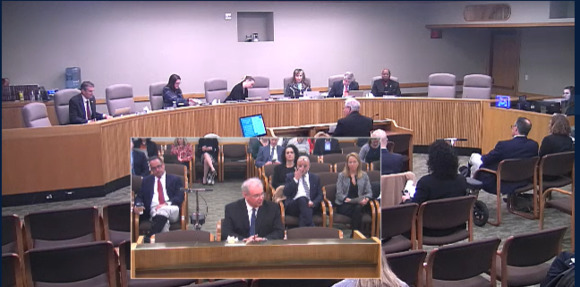Several big issues are beginning to move, and move quickly in Salem. We need to be looking at how these proposed policies affect the future of Oregon and the problems those bills are designed to address. But we also need to balance those concerns with the consequences that may impact every day ordinary people and their day-to-day lives. Here are a few examples along with some other items of interest.
Personal Privacy:
Who has the right to your most personal information? Medical data is being bought and sold as part of an invisible multi-billion dollar industry. I believe your information belongs to you and that you should have the right to keep it private. And if you choose to allow someone to sell that information, you should be compensated.
This was the subject of a measure I sponsored which was heard in the Senate Judiciary Committee this week. Click here to listen to my comments and the interesting conversation that followed.
Testifying before the Senate Judiciary Committee on data privacy
Housing, Tenants, and Small Landlord Protections:
Oregon is facing a statewide housing crisis which affects families and retirees in a very real way. But each unique part of the state experiences that crisis differently. In my last newsletter, I spoke about the dollars the state is allocating to support housing construction, and my own legislation to ensure small cities and rural communities get a share of that money.
I will soon be asked to vote on Senate Bill 608 which addresses tenants and landlords. Most local landlords are not large corporations but families who have invested in one or two rental properties. I have often argued that too many regulations discourage the building or buying of rental investments on the Coast, and encourage smaller landlords to take properties out of the monthly rental market and instead change to nightly vacation rentals. We need to protect renters from abuse. We also need to support the building of more affordable housing.
SB 608 is a carefully crafted set of compromises that attempts to balance landlord and tenant concerns. Here are some of the specifics and compromises of the bill:
Just Cause Eviction: Last session, legislation was proposed to eliminate no-cause evictions completely. The current proposal does not go as far. During the first 12 months of occupancy, a tenant can be evicted (with proper notice) for any reason. After the first year, evictions are only allowed for cause.
Extreme Rent Increases: Some in Salem argue we should cap annual rent increases at 5%. But this bill allows twice as much. Landlords may not increase a tenant’s rent by more than 7% + consumer price index in a 12-month period. That’s an annual maximum of about 10%. Current law already prohibits rent increases in the first year of month-to-month tenancy and requires ninety days’ notice of rent increases.
Landlord Based Evictions: A landlord may terminate tenancy if they sell a unit, demolish, rehab or repair, or are moving a family member in. Ninety days’ notice is required and the landlord must pay one month’s rent in relocation assistance. But importantly, this payment is waived for landlords with four or fewer units.
New Construction Exempt: To encourage new housing, these rules do not apply for 15 years to new construction.
Most of our landlords are reasonable, fair, and work to do right by their tenants. But extreme rent increases and no-cause evictions are destabilizing our most vulnerable renters in some parts of the state. What I need to evaluate is how this proposal will affect housing in our part of the state.
I am concerned that rent controls are shown not to work well and may encourage more annual increases. I’m concerned that we will be both prohibiting and also encouraging no-cause evictions. I’m concerned that this measure impacts mobile home parks in unintended ways. And I’m particularly concerned the bill has been listed as an “emergency” and will take effect as soon as signed by the governor. That means small landlords could be subject to these new rules within the month with little time to understand or adjust to them.
There is every indication this bill is going to pass. I’ll take the weekend to decide how I plan to vote.
Oregon Climate Action Program: House Bill 2020
Here at the Coast, climate change is real. We see the impacts of ocean acidification on shellfish and the crabbing season. We see how warming affects fish runs. We worry about rising ocean levels and erosion. And we see how droughts and warmer summers result in statewide and local forest fires.
For the last three years, legislative committees have been refining plans to address Oregon’s share of climate change. This effort – sometimes called Cap and Trade, Cap and Invest, or the Clean Jobs Initiative — will create a market-based carbon pricing program that seeks to meet greenhouse gas reduction goals while strengthening Oregon’s economy.
Here are the complex details of House Bill 2020:
Oregon’s Greenhouse Gas Reduction Goals: The bill strengthens the state’s greenhouse gas reduction goals to 80 percent below 1990 emissions by 2050 and adds an interim target of 45 percent below 1990 emissions by 2035.
Setting the Cap: The Carbon Policy Office will place an annual cap on total regulated greenhouse gas emissions by setting an annual allowance budget that will steadily decline to meet the state’s GHG reduction goals. Allowances each year act as permits to emit a ton of greenhouse gases. Regulated entities will be required to turn in allowances equal to their emissions.
Annual Auction: There will be an annual auction of allowances that regulated entities must purchase to cover their emissions. There will be a price floor and ceiling to provide certainty and the Carbon Policy office shall adopt measures to protect against market manipulation.
Direct Allocation of Allowances: To protect Oregon businesses that are at risk of leakage and to offset potential impacts to low income utility customers, a certain amount of allowances will be directly allocated to regulated entities.
Program Investments: All investment of proceeds from the auction must meet the goals of the program, which include: (1) reducing greenhouse gas emissions, (2) sequestering carbon, (3) helping communities adapt to the impact of climate change, (4) helping communities and businesses adjust to a new low carbon future.
Accountability: Program expenditures will be audited annually.
What’s Next? Two public hearings in Salem were scheduled for February 15 and 18. The Joint Committee on Carbon Reduction now plans to travel around Oregon for a series of remote hearings. On Monday (February 25) from 6-7 p.m., the Committee will be hearing remote testimony from OSU’s Lincoln County Extension in Newport. This is your chance to ask questions and share concerns with those currently working on the Clean Energy Jobs Bill.
By the first week of March, the Committee will have heard feedback about the bill and will consider a first round of amendments. Of critical concern to me is not only addressing or responsibility to future generations of Oregonians, but also how these proposed changes may affect the current cost of fuel, utilities, and food.
Capitol Visitors:
Hard questions and difficult choices fill every day when the legislature is in session. But a highlight is when friends from our district come to visit.
This week, 40 students from St. James Santiago School came to their Capitol. Their artwork has been on display this month in my office. The visit got a bit crowded but was still good fun. I took some time to walk the students around, show them the Chamber where we debate and vote, and introduce them to portraits of some of our most famous Governors.
Thanks to St. James Santiago School from Lincoln City for sharing your art with my office!
My days in Salem are usually filled with back-to-back meetings, but I’ll always make time for those who drive in from House District 10 to see me. Please send my office an email if you’d ever like to meet in person in our Capitol.
Warm Regards,
Representative David Gomberg
House District 10
email: [email protected]
phone: 503-986-1410
address: 900 Court St NE, H-471, Salem, OR, 97301
website: http://www.oregonlegislature.gov/gomberg








